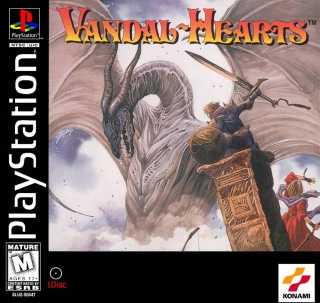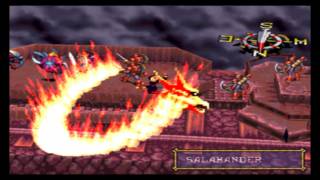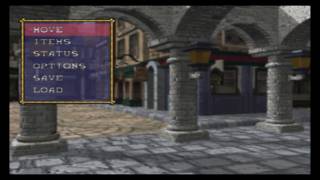Following the trend of list-making I thought I'd have a bash and shed some light on what my Top 5 games of all time are -- very likely to be some obscure choices here.
#5 - Vandal Hearts [PS1]
Released in '96-'97, this SRPG didn't exactly sell bucketloads. Along with Konami's Suikoden franchise at the time, the Vandal Hearts games (of which there were 2, the first and the very lacking sequel) did make it across to all territories albeit with tepid reception, a crying shame as many SRPG game fans are missing out on one of the most well paced, well written and satisfying games of the genre.

As one of the first (perhaps the first?) SRPG titles on a 32-bit console, Vandal Hearts takes place on a 3D battlefield with rotatable camera akin to the likes of Final Fantasy Tactics and Disgaea today and so for fans of the genre today the game does not necessarily feel too dated to the 21st Century SRPG fan.
The Hero of the story is Ash, of the Ishtarian Security Forces who gets pretty caught up in some high-level corruption in thr Government and, as you would expect, it is the job of the player to sort out this mess which climaxes with the enounter of one seriously evil and manipulative son of a bitch at the end of the game - a testament to the narrative is the sheer satisfaction and justice the player feels as the sprite dies in a satisfying, if a little over the top, spray of blood. Sephiroth, eat your heart out.
However the story itself is nowhere near as impressive as the characters themselves; Vandal Hearts contains a roster of brilliantly crafted characters who are portrayed in extremely realistic ways, albeit in a fantasy world. The characters are very well written and the situations which arise draw the player in; it is impossible not to grow attached to at least one of the elements within the roster. There is also a great variety in personalities and there never seems to be one character essentially out of place in terms of story, everyone plays a part and there are no real overlapping personalities which render any one character obsolete. This is something which I feel is missing with regards to a lot of SRPGs today which seem more focused on allowing you to hand pick your roster and create faceless characters which play no significant part in the overall narrative.

The game does have a class advancement system a kin to that found in most SRPGs, however there are a couple of notable differences. For instance, each character has a 'base' job which allows them to branch into two different classes. For instance, a Bowman can develop into a Hawknight or an Archer. From these choices there is a rock/paper/scissors like system which determines the effectiveneess of a unit - a Hawknight is effective against melee warriors but ineffective against an Archer. There is a further step in this class development meaning that each character can advance twice (eg, Bowman > Hawknight > Sky Lord) and there never seems like an imbalance in the number of units with regards to the possible character combinations; one of every unit can be created and then there is room for multiples of class.
One major difference in the mechanics of the game itself that sets Vandal Heart apart, and in my opinion, above the the rest is the way that the levels are treated. As

To conclude, Vandal Hearts is a very often overlooked classic SRPG. While there may not be as much in the way of micromanagement, mechanically the game is very much on the level of modern SRPGs and as such easily accessible. The game progresses with most completed levels and characters develop to a degree which hasn't been seen in the genre for some time, both in terms of the heroes and the villains. It is a tightly packed, satisfying and down right fun experience which can be appreciated by a modern audience, and is a great starting point for those who want to get into the genre and definitely deserves its place on my Top 5 Games of All Time.
Log in to comment